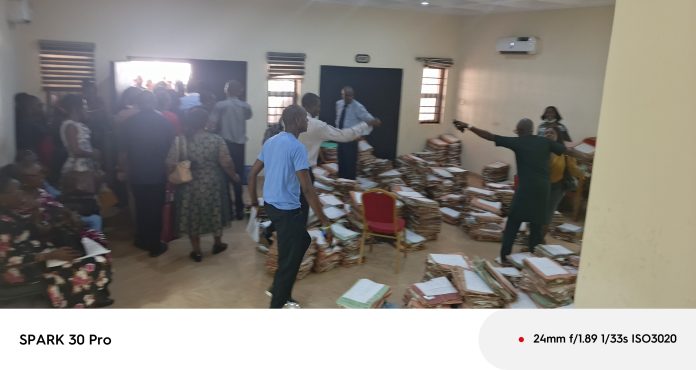A chaotic and controversial screening exercise aimed at weeding out over-aged and age-falsifying civil servants has drawn sharp criticism from senior officers and observers, raising concerns over the Delta State Government’s handling of the process.
The exercise, which primarily affects Level 16 and 17 officers, has left scores of senior civil servants stranded, frustrated, and subjected to indignity at the hands of the Civil Service Commission.

Reports indicate that many officers had to wait overnight at the headquarters of the Commission in Asaba while others lunched in hotels due to poor coordination and lack of preparedness by the organizers.
An investigative visit by The Story revealed disorganization at the screening venue, where civil servants were seen combing through scattered files in a desperate attempt to locate their names and avoid being forcibly retired.
The files, rather than being properly sorted according to Ministries, Departments, and Agencies (MDAs), were dumped indiscriminately across the reception area.

“It is disheartening,” said one senior officer who asked to remain anonymous. “Some of us have served this state for over three decades. To be treated this way, without basic respect or structure, is a disgrace.”
Others accused staff at the Office of the Head of Service (HoS) of exploiting the confusion by demanding bribes in exchange for assistance locating files.
“We’re being forced to go to the HoS office individually to search for our files, and some of us are being extorted in the process,” another source alleged.

The situation has prompted calls for Governor Sheriff Oborevwori to intervene immediately.
Stakeholders are urging the governor to direct the Chairman of the Civil Service Commission, Chief Roseline Amioku, to suspend the exercise and initiate a proper review.
In any setting where every civil or public servant who are currently receiving salary has their complete data already captured by the Pre-Audit and Computer Center.
Given this, stakeholders are questioning why civil servants are still being subjected to outdated, manual processes when their information is already digitally documented.

“It’s illogical,” said a source familiar with the matter. “Why ask civil servants to search for physical files when the data already exists in the system? It simply doesn’t add up.”
This situation underscores the urgent need for full digitalization and automation of personnel records to spare civil servants the recurring ordeal of disorganized screenings.
Critics argue that the current approach lacks transparency and fails to uphold the dignity of senior management staff.
“This is a workforce that has gone through multiple screenings, including those conducted under the administration of former Governor Ifeanyi Okowa,” noted one civil servant. “Why the sudden haste and chaos now?”

Tragically, sources also confirmed that at least two civil servants reportedly died from shock after receiving sudden retirement notifications, further raising concerns about the psychological and emotional toll of the exercise.
The Commission, which has yet to issue an official statement, is now under fire for what many are calling a failure to implement a humane and well-coordinated process.
Critics argue that while the fight against age falsification is important, it must not come at the cost of human dignity, due process, or the mental well-being of civil servants who have given decades of their lives in service.
As calls for accountability grow louder, the spotlight now rests squarely on the Delta State Government to take corrective action and ensure that any future reforms are carried out with the respect and efficiency befitting a professional civil service.
It would be recall that Chief Amioku’s appointment was formalized during a swearing -in ceremony presided over by the State Governor, Rt. Hon. Sheriff Oborevwori, on May 10, 2024.
At the event, the governor emphasized the need for the Commission to address issues such as the ghost worker syndrome and to enhance productivity and professionalism within the civil service.
Commission PRO Defends Screening Exercise, Describes It as Internal and Governor-Directed
Contacted for a response, the Public Relations Officer (PRO) of the Delta State Civil Service Commission, Joy Christabel Sylvester, defended the ongoing screening of senior civil servants, stating that the exercise is strictly internal and not meant for public engagement.
“This is a private, in-house exercise, which is why it hasn’t been publicized,” Sylvester explained. “It concerns only civil servants and is being handled internally for their interest. That’s why it wasn’t put in the public space.”
According to her, the screening, targeting officers on Grade Levels 15 to 17, only commenced recently, and the commission is still in the early stages of the process.
“We started the exercise just yesterday. It’s still ongoing, and whatever issues arise, we will review them at the end.”
When asked why senior officers were being made to individually search for their files at the Office of the Head of Service, she responded that the process was not unusual.
“This has always been the procedure, even when we go for screenings at the HoS, we go through the same system,” she said, describing it as a routine in-house method.
Sylvester also revealed that the screening was initiated by directive of the state governor and is intended to verify the ages of civil servants and monitor the integrity of the commission’s workforce.
“We need to see our employees physically. If someone doesn’t show up when invited, it indicates they may no longer be in service,” she emphasized.
Addressing the issue of missing files, the PRO clarified that responsibility lies with the respective offices of the affected workers.
“These files are expected to come from the offices where the officers are posted. If they are missing, the affected individuals should contact their departments to ensure the files are forwarded to the Commission,” she said, noting that the Commission had already requested the files before the screening began.
She concluded by reaffirming the Commission’s commitment to reviewing the entire exercise thoroughly once it concludes.

















